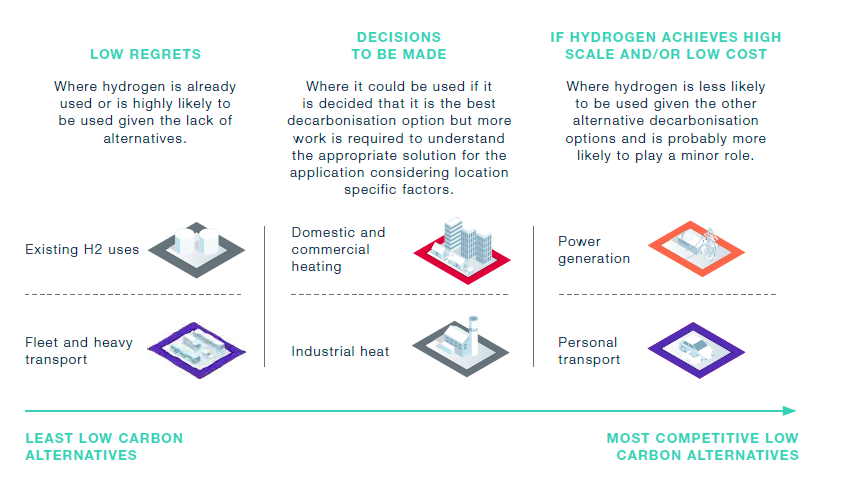
Energy Voice, and numerous other media outlets, covered the Scottish Government’s Hydrogen Policy Statement issued on the 21st December. The policy statement was informed by the Scottish hydrogen: assessment report issued on the same day.
Reviewing the assessment report it is clear that the policy has yet to be verified by evidence in some very important areas. Hence it is a policy in progress.
Here are the assessment conclusions in the key energy demand sectors followed by my observations.
Transport Sector
“Hydrogen offers significant advantages over electric vehicles (EV) in heavy fleet vehicles such as buses, heavy goods vehicles (HGVs), non-electrified trains and ferries. Use of hydrogen vehicles in these favourable modes could be encouraged in the short to medium term to drive demand certainty, and to ensure rapid decarbonisation.”
Greenhouse gas emissions from transport are dominated by the passenger car and the light vans. The hydrogen assessment accepts that battery electric passenger cars and light vans is the preferred option. Hence hydrogen is tackling the smaller, but important, area of heavy haulage and shipping. Trains are only 1% of UK GHG emissions and the unelectrified part of the Scottish rail network is very minor with respect to emissions and could be served by drop-in bio-fuels.
The assessment makes no recognition of future battery developments. Solid state and other advances will see battery energy density greatly improve thereby making inroads into heavy haulage. Indeed it is already happening as evidenced by Scania.
Buildings and Heating
“The flexibility and storage potential offered by hydrogen could be key to addressing inter-seasonal heating demand. The existing gas distribution network could be repurposed to hydrogen, potentially easing the transition from natural gas. However, the evidence base must be developed to support longer term decisions on the future for hydrogen in the gas network. If the indicators are positive, the use of hydrogen in domestic, commercial and industrial space heating could to play an important role in unlocking blue hydrogen production.”
Clearly the Scottish Government is not yet convinced that hydrogen is a natural gas network replacement for heating. The UK’s Climate Change Committee has already made that decision in its Balanced Net Zero Pathway. Their recent report states that ‘By 2050 all heat demand is met by low-carbon sources of which 52% is heat pumps, 42% is district heat, 5% is hydrogen boilers and around 1% new direct electric.’ Hence, little place for hydrogen for space heating. I’m convinced the Scottish Government will come round to that same conclusion when it complete its evidence base.
Industrial and Power Generation
“Hydrogen is already used in industry as a feedstock, but its use could be significantly expanded. Industrial use could generate the scale of demand required to create blue hydrogen hubs in conjunction with CCUS. It is anticipated that both blue and green hydrogen could both be used in industry. Current natural gas power generation could be replaced by hydrogen generation in order to support peak electrical demand, though this is likely to play a more modest role in peaking plants given the amount of renewables in Scotland.”
The major role for hydrogen here is for industrial heating. As someone who has spent much of a 45 year career working on industrial heating options, I find the use of hydrogen surprising. Steam is used extensively in industry as a heating medium with the steam generated by burning natural gas. Compared to hydrogen combustion, steam can be generated much more efficiently using industrial heat pumps as is concluded by the US Department of Energy. Very high temperatures may be an application for hydrogen, or when a reducing agent is required, but these are limited uses.
The assessment report concludes with the following figure;

Clearly there remain significant uncertainties in key areas. That begs the question why issue a policy statement when there is so much remaining to be decided?
The need for hydrogen evidence is further reinforced by the Scottish Government’s recent request for CVs for the position – Head of Hydrogen Evidence and Engagement.
Tom Baxter is visiting professor of chemical engineering at Strathclyde University and a retired technical director at Genesis Oil and Gas Consultants
Recommended for you
